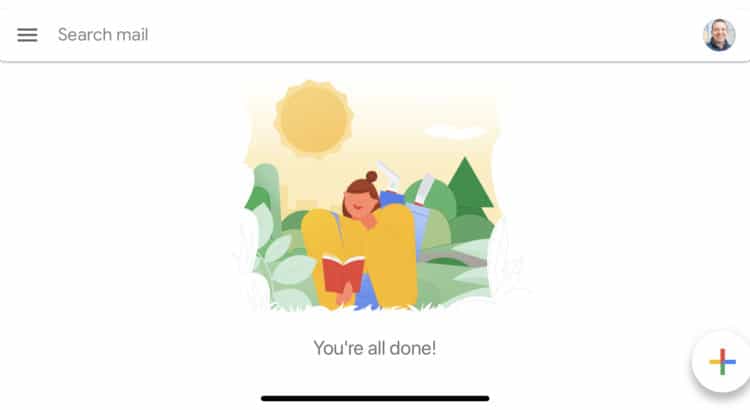Like all of us, I am an idolator—both in ways I am aware of, and doubtless in even more I have yet to get my head around.
The object of what would seem to be my highest devotion is both a material condition and a state of mind. Like the root of much individual and structural brokenness and sin, desiring it is not a bad thing intrinsically. Quite the opposite—the whole point of my dogged pursuit and disordered vigilance is supposedly to be more available, more aware, more responsive, more creative. “Mind like water,” repeateth me and my zealous co-religionists like a mantra. “Mind like water.”
I’m talking, of course, about email. Or rather the absence of it.
My idol-in-chief is Inbox Zero, that fleeting state of grace when I have no messages left to reply to, no outstanding work or favor or pleasantry that isn’t otherwise enshrined in a to-do list or calendar block.
As a suggestion, or perhaps its own twisted substitute reward, when an inbox is empty the Gmail mobile app displays a cartoon woman peacefully reading a book in the park. This efficient emailer—both righteous and free—is sprawled out in prone position in the grass, hair in a bun, high tops playfully pointed skyward. The sun is shining down on her, on the park, and even on the physically and symbolically distant cityscape beyond.
She is the person I aspire to be. She has managed her time and relationships well. Peace, of mind and of body, is her reward. Or so I effectively tell myself day after day, message after message, as I pursue the unobtainable: small friendly letters below the cartoon that say “You’re all done!”
**
It’s unlikely that I am the first preacher to tell you that most of us have some messed up ideas about peace, though perhaps I’m the first to use email as the introductory metaphor.
And we are right to remind each other, first and foremost, perhaps with some key assists from the scriptures, that peace is not an absence.
It’s certainly not an absence of conflict. Jesus tells us he came not to bring this kind of peace, but indeed to bring a sword. “You can’t ignore conflict,” he says, “and I came to stir it up, even between you and your loved ones, if you’re making that idea of peace an object of your worship, a barrier to justice and right relationship.”
Even more importantly, peace is not an absence of risk or vulnerability. Indeed, some commentators on this passage we heard from John’s gospel detect a sly political resistance from Jesus here: “I do not give you peace as the world gives it.” This comment may refer to the Pax Romana imposed among his people and beyond, “peace through strength,” peace through domination and intimidation, supposed superiority. I am at peace because I have subdued my enemies.
In a funny way, my relationship with my inbox is partly characteristic of a desire for this distorted experience of peace. If there are no messages in my inbox, it’s representative of there being no demands on my time that I haven’t already consented to, no thorny strategic quandaries I might choose the wrong approach to tackling, no new worst-case scenarios to anticipate.
Caesar though I am not, an empty inbox still makes me feel like I’m in control of my own destiny—at least until that next pull request to Google’s mail servers.
**
Peace is not an absence but a presence. Peace is noticing our anxieties, our vulnerabilities, and our conflicts—and trusting that there in the midst them is the God who has promised to be with us always.
Peace as presence is the presence of mind that helps us put our day-to-day concerns in their proper perspective. Or when we cannot do so on our own, it draws us out of ourselves to seek support and insight from others, including people who love us and know us well.
Peace as presence is accepting that we can be incomplete and still be whole, never fully arriving, but at home with God nonetheless. Jesus gives the disciples his peace toward the end of his earthly ministry, but it is only the beginning of theirs. The peace of Christ is how they will learn to live with the mistakes they continue to make, to love the vocation they have been called to and yet will deny them the control that false peace promises.
Peace as presence is the moment just after a long, slow, calming, healing breath—even when our next breath may have an altogether different character. Peace is both that fleeting and that available. But because its true source is God, and not our circumstances or our ourselves, by grace it can find a home in us.
